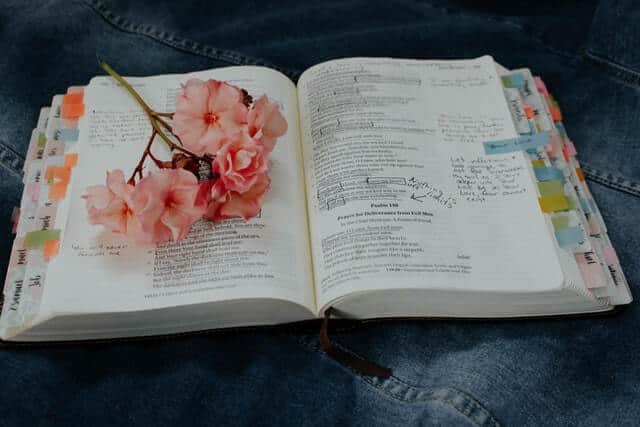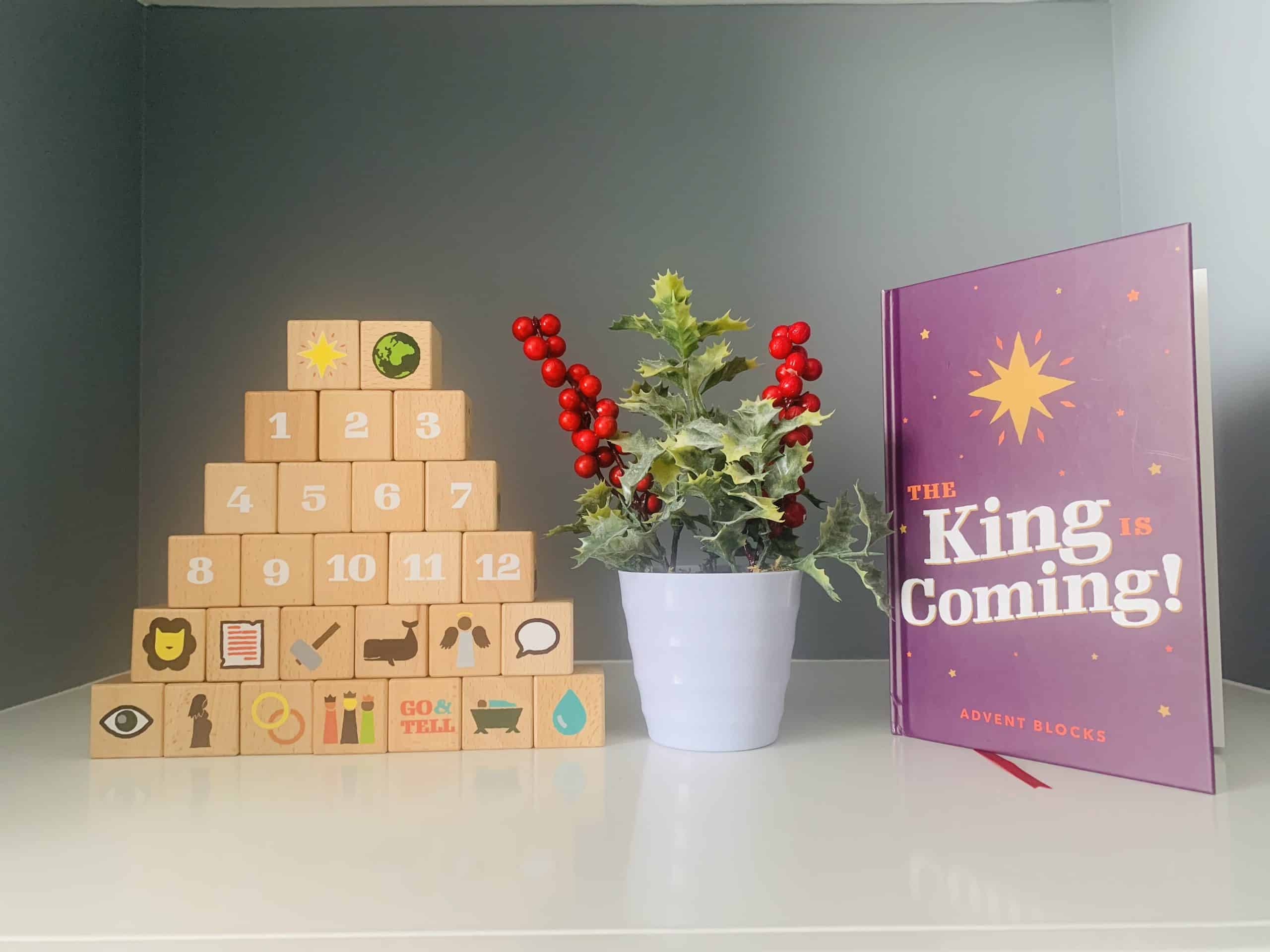Where to Start Reading the Bible For Beginners – Best Tips

Are you looking to read the Bible but don’t know where to start? If you are a new Christian or new to Bible study, you might find yourself pondering where to start reading the Bible?
From a far, the Bible can seem like a daunting book to read. It’s thick, seems boring, has several hundred pages and am sure you have tons of questions. But, don’t let that stop you from reading the Bible!
There are plenty of ways to get started, even if you’re a beginner. Maybe you have wondered, how should a beginner start reading the Bible? what is the proper way to read the Bible? what is the easiest Bible to read for beginners? In this post, we’ll discuss these questions and give you a few recommended Bible reading plans to get you started. So, let’s dive in!
This post may contain affiliate links. You can read my full affiliate disclosure here.
Where To Start Reading The Bible For Beginners
The entire Bible is a collection of smaller stories within its 66 books, written by over 40 different authors. The sheer size of the Bible can be an intimidator.
I am sure if you ask 10 people where to start reading the Bible, they will probably all give you a different response. Start in John, Start in Genesis, Start with the book of Psalms or the book of Proverbs that’s because to be honest there is really no wrong answer in where to start reading the Bible.
But there can be challenging ones, looking at you Leviticus and Revelation! When it comes to where to start reading the Bible, you are the ultimate decisionmaker.
You could start with the short books or the story themed books of the Bible such as Ruth or Esther. This is what I did partly because I felt the Bible was boring and at the time this was how best I connected with God’s word.
But, as I have grown in my walk, I have opted to study topics to gain a better understanding of what I believe and why, I have spent some time diving into understanding the gospel as well as reading the Bible in its entirety to get a big picture overview. With this in mind, here are my suggestions for someone new to Bible study.
Topical Bible Studies
Topical Bible studies are a powerful way to delve into specific themes, concepts, or questions you have about topics in the Bible. It provides a structured approach to exploring and understanding God’s Word.
Conducting a topical Bible study involves selecting a particular subject, such as love, faith, forgiveness, or prayer, and gathering relevant passages from various books and chapters of the Bible that address that topic.
By examining these verses, analyzing their contexts, and drawing connections, participants gain deeper insights into the Bible’s teachings and how they apply to their lives.
Topical Bible studies not only promote a deeper understanding of Scripture but also foster spiritual growth, encourage discussions, and facilitate personal reflection.
If you are new to the faith consider doing topical studies to answer questions you may have and or use it to fully understand what you believe and why. It could be a good place to start for you!
Read The Book of Genesis
One of the books I often recommend to those new to reading the Bible is the book of Genesis. Its a great foundational book to what comes next and is the best place to start. Think of it as a great introduction to the rest of the Bible. In the book of Genesis we read the creation story and learn about how sin first entered our world. Genesis lays the foundation for the story of the Gospel.
In Genesis, we see God making covenants with our forefathers which later come to pass as we read later books and chapters in the Bible. While its a long book, the Bible will come alive for you as you read for yourself popular stories from the Bible you may have heard as a kid growing up.
Stories such as The Tower of Babel, The Story of Joseph and Noah and the Ark. Finally in Genesis, we see the establishment of the nation of Israel through the sons of Jacob. The story of the gospel starts right here in the book of Genesis.
Explore The Gospels
After sin entered the world, God promised to send his son to save us from our sins. We see the fulfillment of this promise in the gospels (Matthew, Mark, Luke, John) with the life and death of Jesus Christ and the concept of eternal life.
Within the gospel accounts you will learn about how Christ lived his life while on earth. These books of the Bible provide different perspectives on the life, ministry, and teachings of Jesus, offering invaluable insights into his message of love, forgiveness, and redemption.
If reading four books seem way too overwhelming, consider reading just the book of John. Of the four gospels, the gospel of John gives us a more in-depth look into the life of Christ. If you want a shorter read, consider the gospel of Mark. The book of Luke and the book of Matthew are also great resource on the life of Jesus!
Read The Bible in Chronological Order
This is by far my favorite way to read the Bible, one of the best Bible reading plans is to read the Bible in a year! What you may not know however is that the Bible is organized based on literary genre, its not written in order of events.
Consider reading the Bible chronologically in order of events to get a broad picture overview of the story line of the Bible. Learn more about reading the Bible chronologically and download your free chronological Bible reading plan.
You can use The Bible Recap reading plan on the YouVersion app to keep track of your readings. What’s great is that they also have a book and Podcast that you can use to provide a little extra context to what you are reading.
Read The Epistles
This one was recommended to me by one of my favorite Bible Study teachers and I am passing it along to you. Plus there are plenty of books to choose from and these are often on the shorter side.
Not only are they practical but they are filled with impactful messages on living a Christian life. You will also learn about the challenges of the early church and walk away with lessons that are applicable to our lives today. The Pauline Epistles were written by the Apostle Paul.
Pauline Epistles – Letters written by Paul to church leaders and members of the early church. These books include: 1 Thessalonians, 2 Thessalonians, Galatians, 1 Corinthians, 2 Corinthians, Romans, Ephesians, Philippians, Colossians, Philemon, Hebrews, 1 Timothy, Titus, 2 Timothy.
General Epistles -Letters written in response to specific needs or circumstances. These books include: James, 1 Peter, 2 Peter, 1 John, 2 John, 3 John, Jude
For the really short books, I am going to challenge you to read it in its entirety over and over for 30 days. By day 30 you will realize how much more clarity and understanding you have garnered from reading the same chapters repeated. Plus shocker, how much of it you actually remember. Who knows, it just might turn into your new favorite way to read the Bible.
Best Bible Reading Plan
Here are some great resources to check out as you study a book of the Bible. Remember the best way to study the Bible is choosing a method that works best for you using the tips we have provided as a guide. Let the holy spirit guide you!
Genesis Bible Reading Plan Journal
New Believer Tips
There’s no question that reading the Bible is important. But sometimes it can be challenging to read it daily. Here are a few tips to help you get started.
1. Make it Part of Your Morning or Night Routine
One of the easiest things you can do is set a reminder on your phone. Often we just get so busy during our day we forget to stop and set some time to read the Bible. Usually, setting a reminder for when you first wake up or before going to sleep is a great place to start. You can incorporate your daily Bible reading into your morning or nightly routine as well. As you continue with this practice, it will gradually become a habit. Find tips to help you start your day with God!
2. Use a Physical Bible When Possible
Now that we can access scripture on our devices, it has become even more challenging to read the Bible on our phones. I often go to read my Bible through an app only to see I have five different notifications that draw me in. By the time I finish going through them all, I have completely forgotten about studying the scripture for the day! Using a hard copy of the Bible eliminates a lot of distractions for those that get easily distracted.
3. Have a Study Group
Study groups are a fun way to make your Bible studies more meaningful. When you have a group studying the same scriptures, you will be more excited to read in order to share your thoughts on the verses. Most churches will have study groups, or you can create your own with friends and family.
5. Have a Study Guide to Help You
A study guide will also help you study scripture daily. They help you to know exactly what you need to read each day taking the guess work out of the equation. Download our free bible in a year reading plan or our 12 month scripture writing plan to use in your daily studies.
6. Change Up the Way You Read
Sometimes reading the same way over and over again can repetitive. So, change things up. You don’t have to read chapter by chapter all the time. Try a new study method like Inductive Bible Study or even Scripture Writing. Change things up; you just might like it.
7. Have a Study Journal
Sometimes having a simple Bible study journal helps motivate you to study scripture daily. That way, you can record what you are learning and see proof of what you have learned, as you grow in your faith. Often that is enough to keep us motivated, especially during challenging times. A study journal can include your thoughts on the scriptures you read, verses that stood out to you, or anything else you want. Make it personal!
8. Say a Prayer Beforehand
A simple prayer before you begin reading can help you focus on the scripture and keep distractions at bay. When it is hard to focus, I am less likely to read and study scripture, so praying and asking God for help always gives me the strength and motivation I need to keep at it. Here is an opening prayer and closing prayer for bible study you could consider.
9. Choose A Version of the Bible That is Easy to Read and Understand
The easiest Bible to read for beginners is a Bible in a translation that you find both easy to read and understand. Use an app like the YouVersion Bible App to help you explore different Bible Translations. If you have ever wondered why there are so many Bible translations, bookmark this Bible Translations Made Simple guide, that talks about the best versions! In the past I have read from the new international version and the new living translation.
Personally I use the CSB She Reads Truth Study Bible and I absolutely love it, however, if you desire a Bible geared specifically towards New Believers, you will want to get a copy of the New Believers Bible. It is filled with lots of cool features geared specifically to new believers, learn more here.
Understanding of the Bible
The Bible is a treasure trove of wisdom and knowledge. It’s also the story of God’s love for us, His children. That being said, it can be intimidating to read from start-to-finish for the first time. If that sounds like your experience with reading Scripture so far, don’t worry! Be sure to visit our Bible Study Hub filled with lots of Bible study for beginners tips.
Studying scripture is so important and is something we should strive to do daily. If you are struggling to study your Bible daily, try a few of the tips mentioned above. Hopefully, they will help you get back on track and fall in love with your new Bible study routine. What have you found most helpful in assisting you with getting into the word of God and reading the Bible daily?
Additional Articles You May Like:






